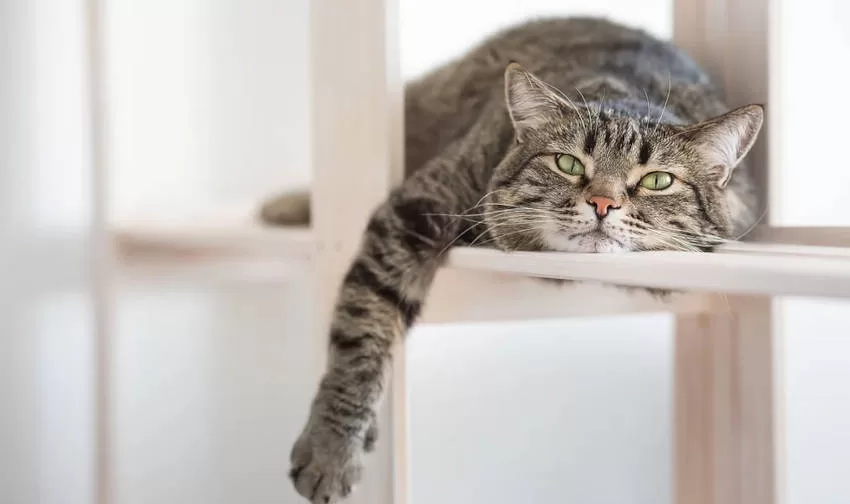Apartment cats are very popular pets around the world. They can be great companions for those who live in urban environments, but it is important to remember that these animals have specific needs that need to be met so that they can live healthily and happily.
In this article, we’ll explore some of the key ways to ensure your apartment cat is adapted to and enjoying its living environment. We will cover everything from creating a stimulating environment to the importance of health and safety care. After all, apartment cats are adorable animals and deserve all the care and attention we can offer.
Key Takeaways
- Apartment cats are popular pets, but it’s important to remember that they have specific needs to live healthily and happily.
- In this article, we will explore ways to adapt and entertain your apartment cat in your living environment.
- We will cover everything from creating a stimulating environment to the importance of health and safety care.
Adaptation of Apartment Cats
Cats are animals that appreciate freedom and outdoor space. For this reason, the adaptation of apartment cats must be careful so that the felines feel comfortable and happy.
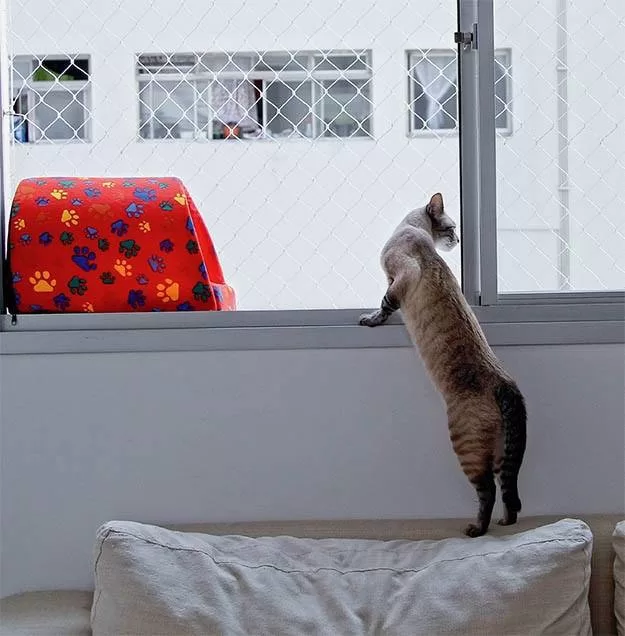
Adaptation of Apartment Cats
At first, it may be difficult for cats to adapt to their new environment. To help with this process, it is important to offer a quiet and safe space for the cat to get used to it. It is recommended to leave the cat in a small room with its favorite toys, a comfortable bed, a scratching post and a litter box.
You must offer quality food and fresh water daily and allow the cat to become familiar with the new space. Once the cat is adapted to this space, it is possible to gradually increase the space available for the feline to explore.
It is recommended to let the cat get used to the daily routine, including feeding times, playtimes and using the litter box, to create a safe and predictable environment. Make sure your cat has access to high areas, such as shelves or bookshelves, so he can observe his surroundings from above.
When adapting an apartment cat, it is essential to provide interactive toys to stimulate the feline’s natural hunting behavior. Rope toys, toy mice and balls are fun options for your cats. Providing scratching posts for cats can also help prevent damage to furniture and encourage feline exercise.
| Important Tip: | Avoid leaving dangerous objects within your apartment cat’s reach, such as poisonous plants, chemicals and small objects that the cat could swallow. |
|---|
Creating a Stimulating Environment
Cats are very curious animals and love exploring new places and objects. However, when living in an apartment, it is important to provide a stimulating environment so they can exercise their natural instincts.
One of the simplest ways to create a stimulating environment is to provide your cat with a variety of toys. Toys that encourage hunting, such as wands with feathers or stuffed mice, are always a good option. Additionally, objects such as scratching posts and tunnels can also help keep your cat entertained and active.
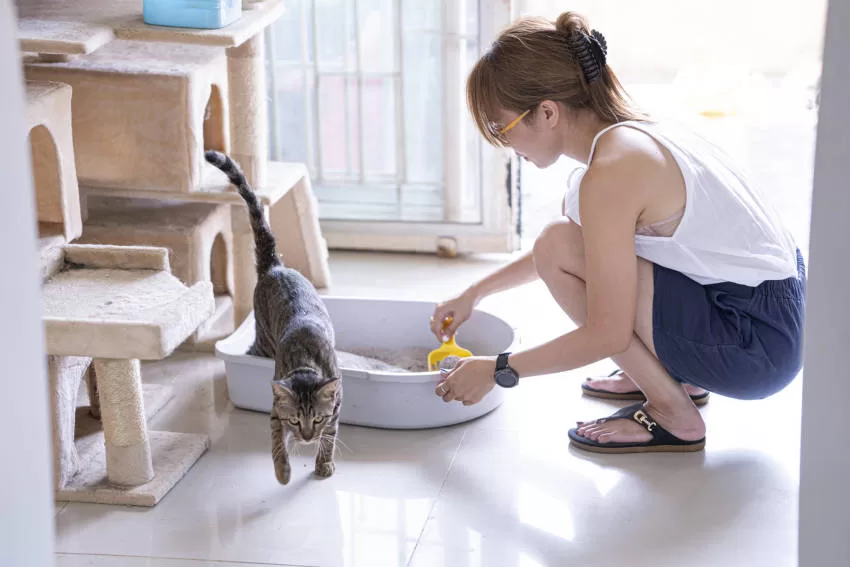
Creating a Vertical Space
Cats also love to climb and hide in high spaces. Therefore, it is important to create vertical space in your apartment. You can create shelves on the walls or buy a scratching post that doubles as a vertical tower for your cat to climb and relax.
Another option is to invest in a cat hammock, which can be installed on a wall or window, allowing your cat to have a wider view of the outside world.
Encouraging Natural Behavior
Finally, it’s important to encourage your cat’s natural behavior, such as the need to scratch. To prevent it from ruining your furniture, provide one or more scratching posts in different areas of the house. Additionally, allow your cat access to safe-to-eat indoor plants, such as wheatgrass, which help stimulate digestion and reduce stress.
By following these simple tips, you can create a stimulating and fun environment for your apartment cat, ensuring it lives a happy and healthy life.
Food Care
A healthy diet is essential for the health and well-being of apartment cats. It is recommended to offer high-quality foods that contain all the nutrients necessary to meet their nutritional needs.
The quantity of food must be controlled to avoid obesity and other related health problems. It is important to follow the manufacturer’s recommendations on the daily amount of food and divide it into small portions throughout the day. Fresh water must always be available.
Prohibited Foods
Some foods are harmful to cats’ health and should not be offered under any circumstances. Among them are:
| Prohibited Foods |
|---|
| Onion and garlic |
| Chocolate |
| Coffee and green tea |
| Grapes and raisins |
| Milk and derivatives |
| Products with xylitol |
These foods can cause everything from gastrointestinal problems to damage to the animal’s liver and nervous system. If your cat ingests any of these foods, it is important to seek medical attention immediately.
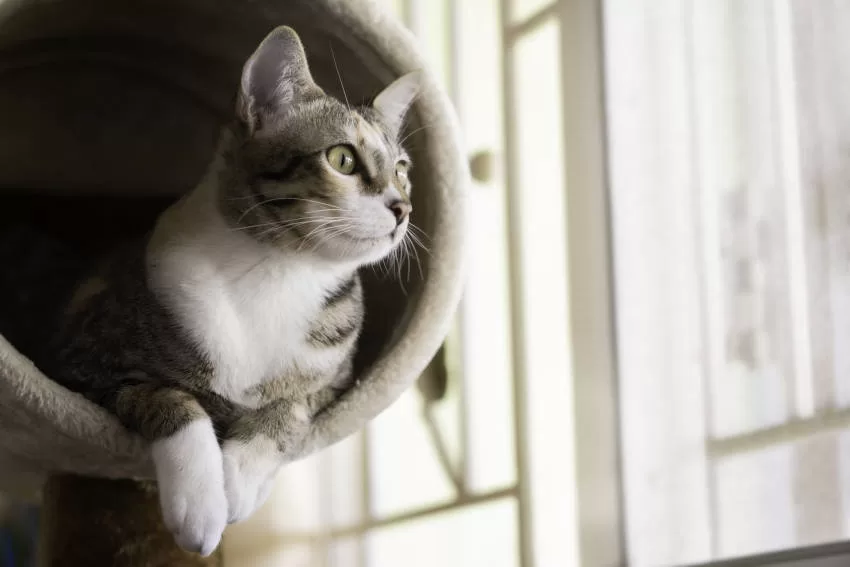
In short, providing adequate nutrition is essential for your apartment cat’s health and well-being. It is recommended to offer high quality food, control the quantity offered and avoid prohibited foods that could cause harm to health.
Socialization and Entertainment
Apartment cats can be very happy if they are socialized and receive daily stimulation. For this, it is important to dedicate time and attention to your pussies. Here are some tips to help socialize and entertain your apartment cats:
Toys
Toys are a great way to keep your apartment cats entertained. Your cats will love playing with board games, toy sticks, cotton balls and other types of toys. Additionally, it is important to change toys every now and then to prevent them from becoming bored with the same toy.
Scratchers
Scratchers are a necessity for apartment cats as they need to sharpen their claws and mark their territory. Additionally, a scratching post can provide hours of fun for a cat, as they love to climb and hide. Make sure the scratching post is safe and sturdy enough for your cat.
Interactive games
Interactive games are a great way to stimulate your cat’s mind and keep your cat socialized. Games like “find the treat” or treasure hunt games can keep your cats entertained for hours.
Introduce other pets
To increase your cat’s socialization, you may consider introducing other pets into your home. Cats tend to get along well with other cats, but the introduction must be done gradually and carefully to avoid conflicts. It is important to remember that cats are territorial animals, so you must allow each cat to have its own space and food.
Quality time
The best way to keep your cat socialized and happy is to spend quality time with them. Dedicate time every day to play and interact with your apartment cats, and they will reciprocate with love and affection. After all, a happy cat is a healthy cat!
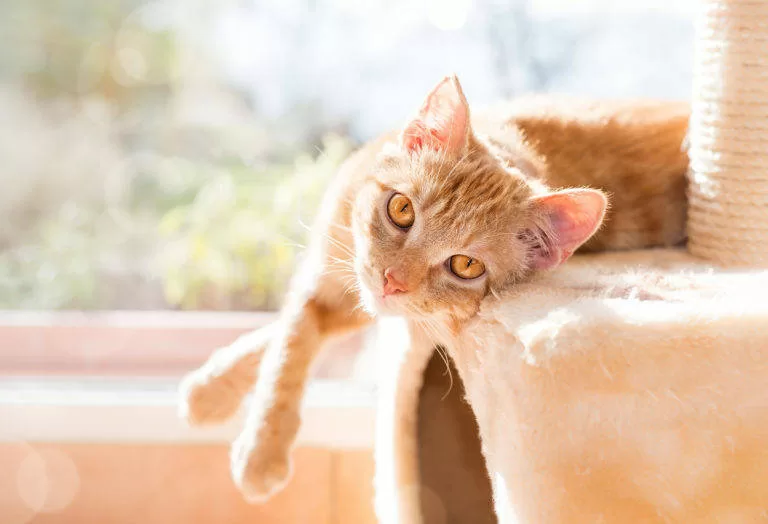
Health Care for Apartment Cats
Apartment cats are more prone to health problems related to lack of physical activity and obesity. Therefore, it is important to take care of the health of these felines in a preventive way.
Regular visits to the veterinarian
Just like any other pet, apartment cats need regular veterinary care to maintain their health. It is recommended that visits to the veterinarian occur at least once a year for routine check-ups and exams.
Pay attention to food
Food is also an important factor in the health of apartment cats. It is necessary to offer a balanced diet in adequate quantities to avoid obesity. Furthermore, it is important to offer plenty of fresh water.
| Foods that should be avoided | Recommended foods |
|---|---|
| – Milk and its derivatives – Foods rich in carbohydrates and sugars – Fatty meats and fried foods – Foods with lots of spices | – Quality cat food – Lean and cooked meats – Cooked vegetables – Specific snacks for cats |
Prevention of diseases
In addition to regularly visiting a trusted veterinarian and maintaining an adequate diet, there are other ways to prevent diseases in apartment cats. One of the most important is to maintain environmental hygiene, eliminating possible sources of contamination.
Parasites
Apartment cats are also exposed to parasites such as fleas and ticks. Therefore, it is important to carry out preventive treatments against these parasites and maintain the hygiene of the environment in which the cat lives.
- Use specific flea and tick control products, such as collars and sprays;
- Maintain environmental hygiene by washing blankets, blankets and beds regularly;
- Carry out constant cleaning and vacuuming of the environments in which the cat circulates.
Taking care of an apartment cat’s health is not difficult, but it does require regular attention and care. With the right information and tips, you can keep your feline healthy and happy in a safe, enclosed environment.
Tips for the Safety of Apartment Cats
Apartment cats need special care to maintain their safety indoors. Check out some tips to ensure your feline’s safety:
- Windows : Check that the protective screens are well fixed and free of tears. Avoid leaving windows open without adequate protection.
- Doors : Be sure to close doors to closets, bathrooms, and other rooms where the cat can get in. Avoid leaving the front door open and always check that the cat is not escaping when leaving or entering the house.
- Toxic products : Keep toxic products, such as cleaning products and medicines, out of your cat’s reach. Avoid using toxic plants at home.
- Electronics : Hide wires and keep electronic devices, such as televisions and computers, in safe, inaccessible locations.
By following these tips, you can ensure a safe environment for your apartment cat, avoiding accidents and health problems. Furthermore, a safe and peaceful environment helps keep the feline calmer and more relaxed, which is essential for their emotional health and well-being.
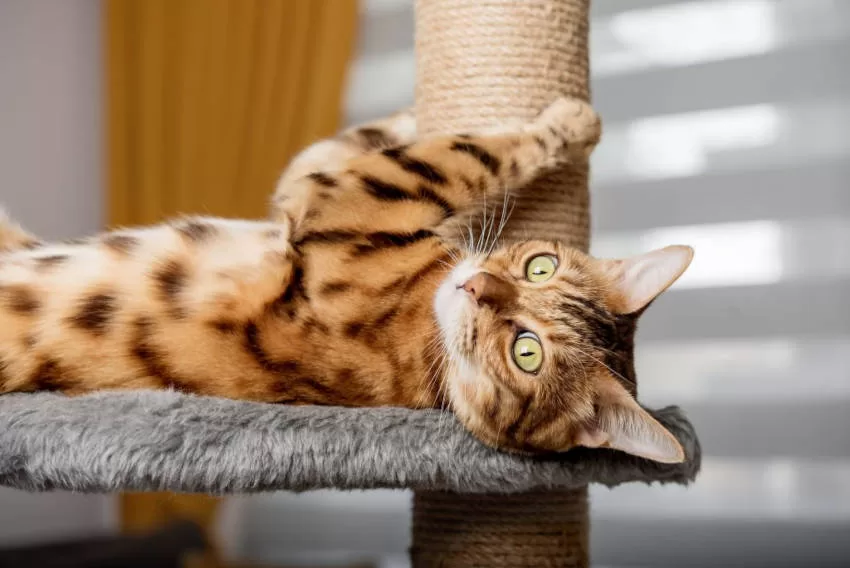
Health Care for Apartment Cats
Taking care of your apartment cat’s health is essential to ensuring it lives a long and healthy life. Here are some tips to help keep your cat healthy:
| Food care: | Provide a balanced diet suited to your cat’s needs. Avoid overeating and choose quality foods. |
|---|---|
| Physical exercise: | Apartment cats need physical activity to avoid obesity and health problems. Toys and scratching posts can help keep your cat active and healthy. |
| Prevention of diseases: | Keep your cat’s vaccinations up to date and have regular checks for parasites (such as fleas and ticks) and other health problems. |
| Hygiene care: | Brush your cat’s fur regularly to prevent hairball buildup and promote healthy skin. |
If your cat shows any symptoms of illness or unusual behavior, take him to the veterinarian immediately. Early diagnosis can help prevent major health problems.
Dealing with Stress and Anxiety
Stress and anxiety can affect your cat’s mental and physical health. Here are some tips to help minimize stress:
- Provide a safe and quiet environment for your cat, with hiding places and comfortable places to rest.
- Offer activities that stimulate your cat mentally, such as interactive toys.
- Maintain a regular feeding and play routine to help your cat feel safe and comfortable.
- Don’t force your cat to socialize or interact with other people or animals if he doesn’t feel comfortable.
If your cat shows signs of chronic stress or anxiety (such as aggression, destructive or hiding behavior), consult your veterinarian to evaluate treatment options.
Routine and Environmental Enrichment
To keep apartment cats happy and healthy, it’s important to establish a daily routine. This helps prevent boredom and anxiety as cats get used to knowing what to expect from their days.
Additionally, environmental enrichment is another important way to keep your cats entertained. It is important to provide toys and objects that can stimulate felines’ natural behavior, such as scratching, chasing and hunting.
You can purchase different types of toys on the market, such as balls, wands with feathers, scratching posts and even interactive games. Make sure that the toys do not have small parts that could be swallowed by the cat.
Another tip is to use creativity to create objects and toys at home. For example, you can create a tower out of cardboard boxes or hide treats in different locations so the cat needs to hunt for food.
You can also use food as a form of environmental enrichment, using interactive feeders and waterers, which make the cat have to work hard to get the food and water.
Daily routine
To establish a daily routine for your cats, it is important to set times for feeding, playing and resting times. This helps the cat feel safe and comfortable in its environment.
Cats need moments to play, but it is also important that they have moments of tranquility and sleep. It is recommended that cats sleep 12 to 16 hours a day, so it is important to provide comfortable places for them to rest.
Environmental enrichment
In addition to providing toys and objects for cats, it is important to create a stimulating environment. This can be done through the use of scratching posts, cardboard boxes, dens, tunnels and shelves, which allow cats to explore the environment in a safe and fun way.
You can create a vertical space, with shelves and stairs, so that the cat can go up and down freely. This allows the cat to feel more confident and have greater independence in its environment.
It is also important to provide places for the cat to hide and feel safe, such as dens and huts. Furthermore, cats love to observe the environment around them, so it is interesting to position the furniture so that the cat can have a broad view of the environment.
Remember that each cat has its own individual preferences and behaviors, so it’s important to observe your cat and adapt the environment to suit its needs.
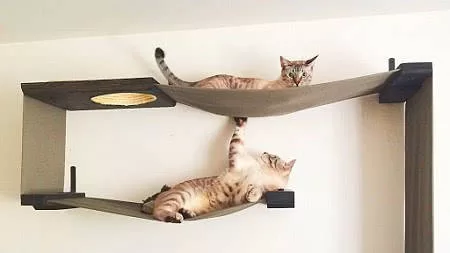
Tips for Dealing with Hyperactive Apartment Cats
Hyperactive cats are animals that need a lot of attention and stimulation to prevent them from becoming destructive or aggressive. Here are some tips to help deal with hyperactive apartment cats:
Create a stimulating environment
Keep your cat entertained with interactive toys that encourage exercise. Make sure he has places to climb and scratch, as well as hiding places to explore. An active gaming environment will help burn off energy and keep you happy.
Establish a routine
Hyperactive cats need routine just as much as calmer cats. Maintain consistent meal, play and rest times. This will help reduce the stress and anxiety that can contribute to hyperactive behavior.
Provide a safe place to sleep
Cats need comfortable, safe places to sleep where they can feel protected. Create a cozy space for your cat with a soft bed, warm blankets, and a crate to sleep in.
Avoid aggressive play
Aggressive play, such as pulling on a rope or using your hands and feet as targets, can encourage destructive and aggressive behaviors in hyperactive cats. Instead, offer safe interactive toys and avoid encouraging aggressive behavior.
Consider behavioral therapy
If your cat is extremely hyperactive and the tips above haven’t helped, consider consulting a veterinarian or animal behaviorist. They can provide additional guidance on how to help your cat calm down and adapt to an apartment environment.
Remember that each cat is unique and may require different types of stimulation and care. Observing your cat and paying attention to its cues can help you determine what works best for your cat. With these tips, you can help your hyperactive cat stay happy and healthy in an apartment environment.
Caring for your Apartment Cats
Congratulations! You made a conscious and very important decision by choosing to have apartment cats. Now, it is essential that you know how to care for your felines so that they are healthy, happy and adapt well to the environment in which they live.
Adapting to apartment cats can take some time, but with patience and dedication, you can help them get used to their new home. It is important to create a stimulating environment, offer adequate nutrition, promote socialization and entertainment and always pay attention to the health and safety of your cats.
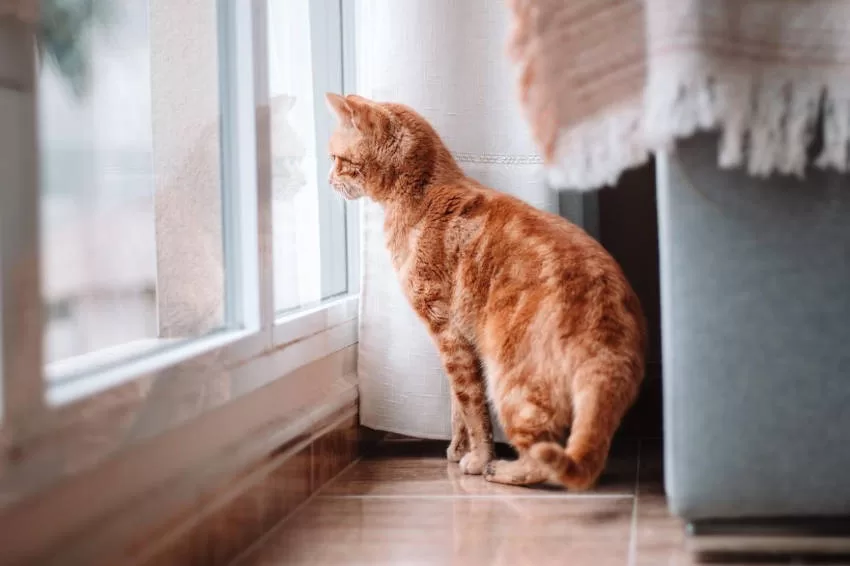
Creating a Stimulating Environment
Apartment cats need stimulation to stay healthy and happy, so it’s essential that you create an environment that offers challenges and fun. Offer varied and interactive toys, scratching posts, shelves and safe places for them to hide and rest.
Keep the environment clean and provide fresh, drinkable water in clean, shallow containers so they can drink easily. Additionally, it’s important to expose cats to sunlight and ensure they have access to windows to observe movement outside.
Food Care
Food is essential for the health and well-being of your apartment cats. It is essential to choose a quality food that meets the nutritional needs of felines and prevents overweight.
In addition, you need to pay attention to the amount of food offered and the timing of meals. Monitor water intake and avoid leaving food remains exposed to prevent the emergence of insects and rodents.
Socialization and Entertainment
Socialization is one of the most important factors for the well-being of apartment cats. It is essential that they live with other cats or people so that they can interact and develop emotionally.
Offer varied and interactive toys, small challenges and activities that stimulate feline intelligence and skills. Make the environment a fun and safe place for them to play and have fun in peace.
Health Care for Apartment Cats
Apartment cats are prone to some diseases, such as obesity, urinary diseases and behavioral problems. It is essential to always pay attention to the health of your felines, taking them to the veterinarian regularly and providing them with appropriate vaccinations.
Keep the environment clean and ventilated and avoid the accumulation of dust and hair. Furthermore, use cleaning products that are safe for cats and avoid the use of insecticides and chemicals that could be harmful to feline health.
Tips for the Safety of Apartment Cats
It is essential to ensure the safety of your apartment cats, avoiding risky situations and accidents. It is important to protect windows and balconies with protective screens to prevent falls and the risk of escape.
Keep cleaning products, medicines and other dangerous objects out of reach of cats. Furthermore, it is important to prevent felines from having access to unprotected wires and sockets, which can be a source of electrical risks.
Dealing with Stress and Anxiety
Apartment cats can develop stress and anxiety due to lack of stimulation and lack of contact with other cats or people. If you notice symptoms of stress in your felines, offer more toys, encourage interaction with other people and cats, and provide a calm and relaxing environment.
Routine and Environmental Enrichment
Create an activity routine for your felines and keep them always active and stimulated. Establish regular times for meals, games and rest times, so that they can feel safer and more comfortable in the environment.
Additionally, offer environmental enrichment, creating interesting and challenging spaces, and offering toys and activities that stimulate felines’ senses and intelligence.
Tips for Dealing with Hyperactive Apartment Cats
If you have more agitated and hyperactive apartment cats, it is important to offer activities that offer challenge and physical encouragement, to use up accumulated energy. Use interactive games, specific toys and other activities that encourage movement and energy expenditure.
Conclusion
Caring for apartment cats can be a challenge, but it brings many rewards and benefits to the lives of felines and their owners. By following these simple tips, you can ensure that your cats are happy, healthy and well adapted to the environment in which they live. Always remember to pay attention to your cats’ health, safety and enjoyment, to ensure a long and prosperous life for them.
FAQ
Q: How can I adapt my cat to the apartment?
A: It’s important to offer a gradual transition, providing safe spaces for him to explore and play. It is also recommended to use scratching posts and toys to encourage physical activity.
Q: What are the best ways to create a stimulating environment for apartment cats?
A: Provide scratching posts, shelves and interactive toys so your cat can exercise and have fun. Also, allow access to windows so he can observe life outside.
Q: How can I take care of my apartment cat’s diet?
A: It is important to offer a balanced diet and control the amount of food to avoid obesity. Consulting a veterinarian for specific guidance is also recommended.
Q: How can I ensure my apartment cat is socialized and entertained?
A: Organize daily games with your cat, offer toys and encourage interaction with other animals or people. It is also important to allow moments of rest and privacy.
Q: What health care should I take with my apartment cat?
A: Have regular veterinary appointments, vaccinate him correctly and provide hygiene care, such as brushing his coat and cleaning his ears. It is also important to prevent fleas and ticks.
Q: What safety tips should I follow for my apartment cat?
A: Keep windows and balconies protected to avoid accidents. Make sure there are no toxic products within reach and keep electrical cords and poisonous plants out of your cat’s reach.
Q: How do I deal with my apartment cat’s stress and anxiety?
A: Provide toys and activities that stimulate your cat, offer moments of relaxation, such as massages and physical contact, and create a stable daily routine so your cat feels safe.
Q: How do I establish a routine and environmental enrichment for my apartment cat?
A: Create regular times for eating, playing and quiet time. Also provide different types of toys and environments for your cat to explore.
Q: What are tips for dealing with hyperactive apartment cats?
A: Increase play and exercise time, offer toys that simulate hunting, and provide vertical areas, such as shelves, for the cat to expend energy.
External Links:

